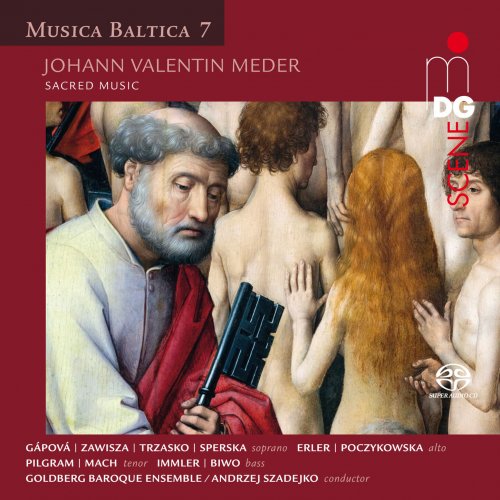
Goldberg Baroque Ensemble, Andrzej Szadejko - Meder: Sacred Cantatas (2020)
BAND/ARTIST: Goldberg Baroque Ensemble, Andrzej Szadejko
- Title: Meder: Sacred Cantatas
- Year Of Release: 2020
- Label: Musikproduktion Dabringhaus und Grimm (MDG)
- Genre: Classical
- Quality: flac lossless (tracks)
- Total Time: 01:09:32
- Total Size: 318 mb
- WebSite: Album Preview
Tracklist
01. Lauda Jerusalem Dominum
02. Quid est hoc quod sentino: No. 1, Sinfonia
03. Quid est hoc quod sentino: No. 2, Quid est hoc
04. Quid est hoc quod sentino: No. 3, Hoc non generat
05. Ach Herr, mich armen Suender: No. 1, Lamento
06. Ach Herr, mich armen Suender: No. 2, Lamento repetatur
07. Gott, mein Herz ist bereit
08. Die hoellische Schlange darf nimmer uns beissen: No. 1, Sinfonia-Aria
09. Die hoellische Schlange darf nimmer uns beissen: No. 2, Rezitativo-Rezitativo-Aria
10. Die hoellische Schlange darf nimmer uns beissen: No. 3, Rezitativo e Aria
11. Wuenschet Jerusalem Glueck
12. Vox mitte clamorem
13. Wie murren denn die Leut' m Leben also?: No. 1, Wie murren denn die Leut'
14. Wie murren denn die Leut' m Leben also?: No. 2, Sinfonia-Aria
15. Wie murren denn die Leut' m Leben also?: No. 3, Preise den Herren, Jerusalem, droben
16. Meine Seele seufzt und stoehnet: No. 1, Sinfonia-Adagio
17. Meine Seele seufzt und stoehnet: No. 2, Sinfonia-Adagio repetatur
18. Gott, du bist derselbe mein Koenig
Continuing MDG's pioneering 'Musica Baltica' series, this new SACD recording presents works by Johann Valentin Meder, who was Kapellmeister at St. Mary's church, Gdansk, until 1698, including motets with up to three choirs. It must have been spectacular when the Council was newly elected in Gdansk - music was played on all organs in St. Mary's Church, and the responsible Kapellmeister had to deliver festive multi-choral works for the occasion. Andrzej Szadejko and his Goldberg Baroque Ensemble convey a fascinating impression of this baroque practice in a splendid premiere recording of Meder's Sacred Music. Elsewhere, multi-choir singing had long since gone out of fashion, but in Meder's music, this opulent and therefore harmonically mostly simple movement style of earlier times is combined with the highly topical concertante style of the Italian Baroque. Meder was always at the forefront of musical styles; one of the first operas in German language was written by him. This lavish production highlights the large, recently reconstructed late baroque Merten-Friese organ on the rood screen of Gdansk's Trinity Church which is also used for the three-choir motets. Together with kettledrums, trumpets and trombones, it completes the tonal triangle with the top-class vocal choirs on the right and left, using the full-sounding pedal work - an exciting sound celebration, which can of course be experienced most impressively in three-dimensional reproduction via MDG's 2+2+2 SACD superb recording technique.
01. Lauda Jerusalem Dominum
02. Quid est hoc quod sentino: No. 1, Sinfonia
03. Quid est hoc quod sentino: No. 2, Quid est hoc
04. Quid est hoc quod sentino: No. 3, Hoc non generat
05. Ach Herr, mich armen Suender: No. 1, Lamento
06. Ach Herr, mich armen Suender: No. 2, Lamento repetatur
07. Gott, mein Herz ist bereit
08. Die hoellische Schlange darf nimmer uns beissen: No. 1, Sinfonia-Aria
09. Die hoellische Schlange darf nimmer uns beissen: No. 2, Rezitativo-Rezitativo-Aria
10. Die hoellische Schlange darf nimmer uns beissen: No. 3, Rezitativo e Aria
11. Wuenschet Jerusalem Glueck
12. Vox mitte clamorem
13. Wie murren denn die Leut' m Leben also?: No. 1, Wie murren denn die Leut'
14. Wie murren denn die Leut' m Leben also?: No. 2, Sinfonia-Aria
15. Wie murren denn die Leut' m Leben also?: No. 3, Preise den Herren, Jerusalem, droben
16. Meine Seele seufzt und stoehnet: No. 1, Sinfonia-Adagio
17. Meine Seele seufzt und stoehnet: No. 2, Sinfonia-Adagio repetatur
18. Gott, du bist derselbe mein Koenig
Continuing MDG's pioneering 'Musica Baltica' series, this new SACD recording presents works by Johann Valentin Meder, who was Kapellmeister at St. Mary's church, Gdansk, until 1698, including motets with up to three choirs. It must have been spectacular when the Council was newly elected in Gdansk - music was played on all organs in St. Mary's Church, and the responsible Kapellmeister had to deliver festive multi-choral works for the occasion. Andrzej Szadejko and his Goldberg Baroque Ensemble convey a fascinating impression of this baroque practice in a splendid premiere recording of Meder's Sacred Music. Elsewhere, multi-choir singing had long since gone out of fashion, but in Meder's music, this opulent and therefore harmonically mostly simple movement style of earlier times is combined with the highly topical concertante style of the Italian Baroque. Meder was always at the forefront of musical styles; one of the first operas in German language was written by him. This lavish production highlights the large, recently reconstructed late baroque Merten-Friese organ on the rood screen of Gdansk's Trinity Church which is also used for the three-choir motets. Together with kettledrums, trumpets and trombones, it completes the tonal triangle with the top-class vocal choirs on the right and left, using the full-sounding pedal work - an exciting sound celebration, which can of course be experienced most impressively in three-dimensional reproduction via MDG's 2+2+2 SACD superb recording technique.
Year 2020 | Classical | FLAC / APE
As a ISRA.CLOUD's PREMIUM member you will have the following benefits:
- Unlimited high speed downloads
- Download directly without waiting time
- Unlimited parallel downloads
- Support for download accelerators
- No advertising
- Resume broken downloads


